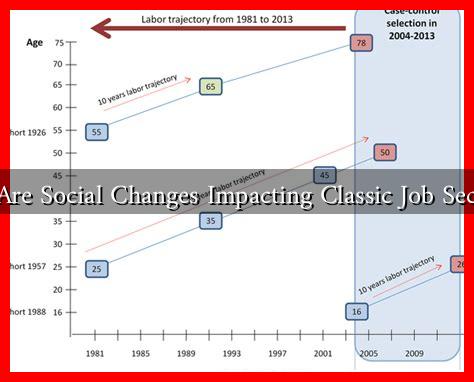-
Table of Contents
How Are Social Changes Impacting Classic Job Security?
In recent years, the landscape of employment has undergone significant transformations, driven by various social changes. These shifts have not only altered the way we work but have also redefined the concept of job security. Traditional notions of stable, long-term employment are increasingly being challenged by factors such as technological advancements, the gig economy, and changing workforce demographics. This article explores how these social changes are impacting classic job security and what it means for workers today.
The Rise of the Gig Economy
One of the most notable social changes affecting job security is the rise of the gig economy. This term refers to a labor market characterized by short-term contracts and freelance work as opposed to permanent jobs. According to a report by McKinsey, approximately 30% of the U.S. workforce engages in some form of gig work.
- Flexibility vs. Stability: Gig work offers flexibility, allowing individuals to choose when and how much they work. However, this flexibility often comes at the cost of job security, as gig workers typically lack benefits such as health insurance and retirement plans.
- Income Variability: Gig workers face unpredictable income streams, making financial planning challenging. A study by the Federal Reserve found that nearly 40% of Americans would struggle to cover a $400 emergency expense.
As more individuals turn to gig work, traditional job security is being redefined. Workers must adapt to a landscape where multiple income streams and self-employment are becoming the norm.
Technological Advancements and Automation
Technological advancements, particularly in automation and artificial intelligence, are reshaping job security across various industries. While technology can enhance productivity, it also poses a threat to traditional jobs.
- Job Displacement: According to a report by the World Economic Forum, over 85 million jobs may be displaced by automation by 2025. Sectors such as manufacturing, retail, and transportation are particularly vulnerable.
- New Opportunities: Conversely, technology also creates new job opportunities. The same report estimates that 97 million new roles may emerge, particularly in fields like data analysis, AI, and renewable energy.
Workers must therefore be proactive in upskilling and reskilling to remain relevant in an evolving job market. Lifelong learning is becoming essential for maintaining job security in the face of rapid technological change.
Changing Workforce Demographics
The demographics of the workforce are also shifting, with younger generations entering the job market with different expectations and values. Millennials and Gen Z prioritize work-life balance, purpose-driven work, and flexibility over traditional job security.
- Value of Purpose: A survey by Deloitte found that 70% of millennials would choose to work for a company that has a strong sense of purpose over one that offers a higher salary.
- Work-Life Balance: Younger workers are more likely to seek jobs that allow for remote work and flexible hours, which can lead to a decrease in traditional job security as companies adapt to these demands.
As these generations continue to dominate the workforce, employers must rethink their approaches to job security and employee engagement to attract and retain talent.
Conclusion: Navigating the New Landscape of Job Security
The interplay of social changes such as the rise of the gig economy, technological advancements, and shifting workforce demographics is fundamentally altering the concept of job security. While traditional notions of stable employment are fading, new opportunities and challenges are emerging. Workers must embrace adaptability, continuous learning, and a proactive approach to career development to thrive in this new landscape.
As we move forward, it is crucial for both employees and employers to recognize these changes and work collaboratively to create a more secure and fulfilling work environment. By understanding the dynamics at play, individuals can better navigate their careers in an ever-evolving job market.
For further insights on the future of work and job security, you can explore resources from the World Economic Forum and McKinsey & Company.

